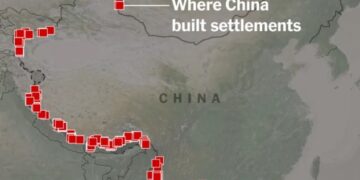The Waqf Board, often embroiled in controversies, is once again in the news. The latest update is that the Central Government is planning to reduce the unchecked powers of the Waqf Board. It is also reported that a bill amending the Waqf Board Act will soon be presented in Parliament. This new bill aims to restrict the power to declare any land as Waqf property. Let’s understand the Waqf Board and its unlimited powers, which easily allow it to take control of any land.
How Does the Waqf Board Operate?
Waqf is an Arabic term meaning an object dedicated in the name of God or money given for public welfare. It encompasses both movable and immovable assets. In essence, the Waqf Board was established to control lands belonging to the Muslim community, to prevent misuse and illegal sale of these lands.
However, today the Board is under scrutiny. The Waqf Board claims ownership of lands around cemeteries wherever it establishes boundaries, taking control of these areas. Since the Waqf Act of 1995 states that if the Waqf Board believes any land is Waqf property, the burden of proof lies with the actual landowner to prove it is not Waqf property.
While the 1995 Act does specify that the Waqf Board cannot claim private property, determining whether property is private is another issue. If the Waqf Board suspects a property is Waqf’s, it does not need to provide any documents or evidence; the onus is on the claimant to provide all the paperwork and proof. Many families lack proper land documents, and the Waqf Board exploits this by taking possession without needing to present any paperwork.
Congress Government Expanded Waqf Board Powers
The Waqf Act was passed during Jawaharlal Nehru’s tenure in 1954, leading to the formation of the Central Waqf Council in 1964. However, the 1995 amendment granted extensive powers to the Waqf Board. The Congress Government under PV Narasimha Rao amended the 1954 Waqf Act and introduced new provisions that gave the Waqf Board immense powers.
According to Section 3(R) of the Waqf Act 1995, any property deemed holy, religious, or charitable under Muslim law for any purpose becomes Waqf property. Article 40 of the 1995 Waqf Law states that the Waqf Surveyor and the Waqf Board will determine the ownership of land. Amendments introduced in 2013 granted the Waqf Board even more autonomy and unchecked power in related matters. Currently, the Waqf Board oversees over 8.7 lakh properties, totalling about 9.4 lakh acres nationwide.
Unchecked Power of Waqf Board
If your property is declared Waqf property, you cannot appeal to the court. You must appeal to the Waqf Board itself. Even if the Waqf Board’s decision is against you, you cannot go to court; you can only approach the Waqf Tribunal. This Tribunal consists of administrative officials, some of whom may not be Muslim. Section 85 of the Waqf Act states that decisions of the Waqf Tribunal cannot be challenged in the High Court or Supreme Court.
How Many Waqf Boards Are There in the Country?
Currently, there is one Central Waqf Board and 30 State Boards in the country. The Central Minority Welfare Minister serves as the ex-officio Chairman of the Central Waqf Board. Past governments have provided grants to the Waqf Board, and the Narendra Modi Government has also shown leniency towards it. The Central Waqf Board has set rules stating that if schools, hospitals, etc, are built on Waqf land, the government will cover the entire cost. This policy was in place when Mukhtar Abbas Naqvi was the Minister of Minority Affairs.

















